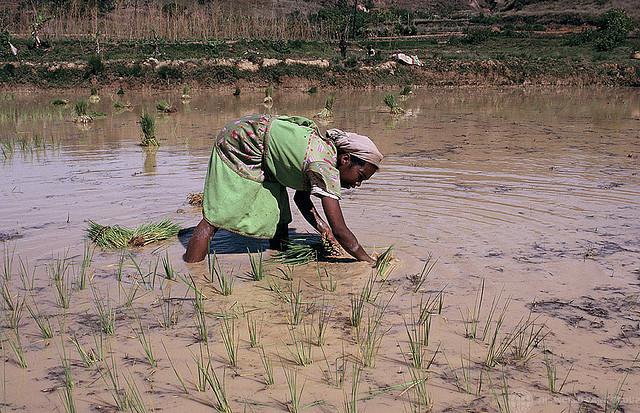Rice production in Madagascar occurs in a variety of areas, from the rainfed central highlands, to the irrigated and terraced lowlands, and semi flooded coastal zones. Roughly 10 million people in Madagascar, or almost 70% of its population, derive at least part of their economic income from rice. In the central highlands, where most of the country’s rice is grown, rice crops are already vulnerable to land degradation and droughts. Rice grown in the lowlands is subject flash floods and extreme temperatures. Other climate challenges include variability in the onset of rains, delays in rainy seasons, as well as disruptions in the amount of rainfall during the rice-growing season.
This project implemented by the United Nations Environment Programme (UNEP) aims to help those in the rice sector increase climate resilience through increased rice production that will withstand projected climate conditions and increased environmental sustainability and ecological services in the rice sector by working with local producers and partners, with the support of decentralized ministries and regional technical partners and supporting the selection of a limited number of optimal integrated rice cultivation models, or systems. The project will also provide the tools for crop modeling and vulnerability analysis, particularly focusing on the rice sector, as well as the development of a climate-based hydrological model for the region, in order to gain a sound grasp of future water availability. As a means of providing stronger technical support to local producers, the project will also provide enhanced agro-climatic services, including updated crop and cultivation calendars that take new climate trends into account. The project will extend climate and weather information to local producers to provide early warning of flooding and drought.
Farmers will receive the appropriate working material, starting with adapted seeds and varieties, appropriate fertilizers and adequate quantities and quality of water. They will learn new land and agrobiodiversity management practices involved in rice production, including sustainability land mangement and agroforestry practices designed to assist communities in coping with climate shocks such as droughts and floods, and to reduce post harvest losses. The project will help bring together government, private sector, NGOs, as well as academic and research institutions and local representatives to examine current policies and make recommendations on the modification of policies, rules and norms related to rice with a view to increasing adaptive capacity in the sector. The project also plans to support replication and upscaling of successful adaptation approaches, and to generate broader scientific knowledge on rice adaptation.
| Project Component 1: Scientific and Technical Capacity | USD 675,000 |
| Project Component 2: Adapted and resilient rice production cycle | USD 2,760,000 |
| Project Component 3: Leveraging policy change | USD 120,000 |
| Project/Programme Execution Cost | USD 325,000 |
| Total Project/Programme Cost (= Project Components + Execution Cost) | USD 4,705,000 |
| Implementing Fee | USD 352,920 |
| Grant Amount (= Total Project/Programme Cost + Implementing Fee) | USD 5,104,925 |
Related Media
- Ecosystem-based Adaptation and an Integrated Resilient Rice Model in Madagascar – UNEP Lessons in Climate Change Adaptation
- Knowledge Sheet on Madagascar Project Study
Project Documents
| Attachment | Type | Size |
|---|---|---|
| Project document | ||
| Inception Report | DOC | 8 MB |
| PPR1 (for web) | XLS | 282 KB |
| PPR2 (for web) | XLS | 297 KB |
| PPR3 (for web) | XLS | 390 KB |
| PPR4 (for web) | XLS | 464 KB |
| Mid-term evaluation report | DOCX | 19 MB |
| PPR5 (for web) | XLSX | 5 MB |
| PPR6 (for web) | XLSX | 5 MB |
| Other project order | 364 KB | |
| Other project order | 367 KB | |
| Final evaluation report | 5 MB |



